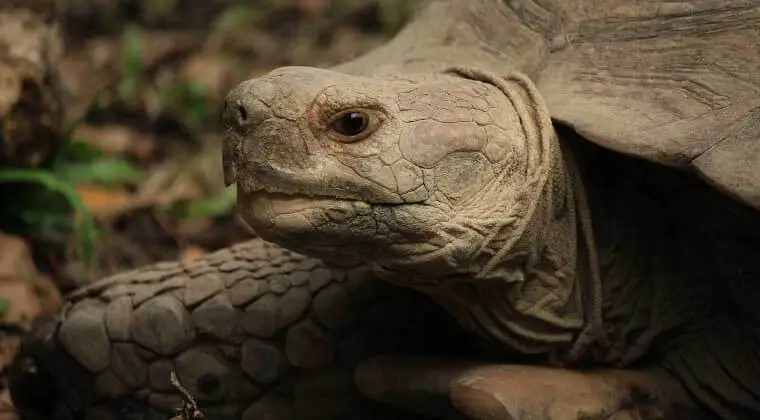Yes, tortoises can eat cilantro. Cilantro is a healthy and nutritious food for many animals, including tortoises. It contains vitamins A and C as well as calcium which are important for the health of your pet tortoise.
In addition to this, it also provides fiber which helps keep their digestive system functioning properly. You should always wash any vegetables before feeding them to your tortoise in order to remove any dirt or bacteria that could be present on them.
When preparing cilantro for a tortoise, you should make sure it is chopped up into small pieces so they can easily swallow it without choking on the leaves or stems. Additionally, you may want to include other leafy greens with your cilantro such as kale or collard greens in order to provide additional benefits and nutrients for your pet reptile’s diet.
Can Sulcata Tortoises Eat Cilantro?
Sulcata tortoises can eat cilantro, but it should be given in moderation since too much of this herb can cause digestive issues. Cilantro is a nutritious food source for sulcata tortoises that contains vitamin A, B6, and K. However, it should not make up the majority of their diet as they need a variety of leafy greens to stay healthy.
Can Tortoises Have Cilantro And Parsley?
Yes, tortoises can have cilantro and parsley. Both are considered safe for tortoises to eat in small amounts as an occasional treat. In fact, both of these herbs provide a good source of vitamins A and C, which help with the immune system and overall health.
Cilantro is also high in fiber, which helps keep your Tortoise’s digestive system running smoothly. Additionally, the leaves of both plants contain compounds that may reduce inflammation in reptiles like Tortoises. When feeding fresh cilantro or parsley to your Tortoise it’s important to only give them small pieces at first to make sure they don’t choke on it or get upset stomachs from eating too much at once.
It’s best if you mix their herb treats with other safe vegetables such as kale or spinach before giving it to them so that its flavor isn’t too overwhelming for them at first. Always be sure to wash any produce you feed your Tortoise beforehand since animals can pick up diseases from unwashed fruits and veggies just like humans can!
What Greens Are Safe for Tortoises?
Tortoises are herbivores, so it’s important to feed them a variety of greens that provide the necessary nutrition. Greens that are safe for tortoises include dandelion, collard, mustard, and turnip greens; escarole; endive; red or green leaf lettuce (not iceburg); cilantro; parsley; kale, and Swiss chard. When feeding these types of greens to your tortoise, make sure they are washed thoroughly with no chemical residue remaining.
In addition to fresh vegetables and fruits such as apples, berries, melons and squash in small amounts can be offered as treats. Some other items you may add sparingly to the diet include clover sprouts, grass hay or alfalfa hay (not treated with chemicals), hibiscus flowers/leaves/pods, and rose petals/flowers/hips. Avoid giving too much fruit since it could cause nutritional imbalances in your tortoise’s diet due to its high sugar content.
You may also want to consider adding supplements like calcium powder or multivitamin powder occasionally for added health benefits if recommended by a veterinarian specializing in reptiles such as turtles and tortoises.
Can Turtles Have Cilantro?
Turtles are omnivores, meaning they eat both plants and animals. This means that they can in fact enjoy cilantro as part of their diet! However, it is important to note that turtles should only be given small amounts of cilantro at a time since too much can lead to constipation or other digestive issues.
Cilantro makes an excellent addition to salads for your turtle as long as you make sure there are plenty of other nutritious vegetables present as well. It is also a good idea to mix up the types of foods your turtle eats so that he gets all the essential vitamins and minerals his body needs for proper growth and development.
To ensure safety when feeding cilantro to your turtle, always wash it thoroughly before giving it to him, no matter what form it’s in (fresh leaves or dried). Additionally, monitor how your pet reacts after eating this herb in order to spot any adverse reactions early on.
What Plants Can Tortoises Not Eat?
Tortoises are herbivores and rely on vegetation for their nutrition. While they will eat a variety of plants, there are some that can be dangerous or even deadly to them if consumed. Some examples of plants tortoises should never consume include tomatoes, potatoes, peppers, rhubarb, onions, and garlic as these can cause digestive problems and nutritional deficiencies in tortoises.
In addition to these vegetables, many flowers such as azaleas, daffodils, and hyacinths are also toxic for tortoises so it is important to make sure you avoid giving your pet access to any part of these plants.
Finally, certain fruits like citrus fruits (including lemons and oranges) contain high levels of acids that can irritate the mouth or digestive system of a tortoise so it’s best not to offer them at all. Keeping your pet away from potentially harmful foods is essential in ensuring they stay healthy!
BILL THE SULCATA TORTOISE EATING CILANTRO!
Conclusion
It is important to remember that tortoises are herbivores and should only be given fruits and vegetables as part of their diet. While cilantro can be a beneficial addition to the diets of some reptiles, it should not be fed to tortoises due to its high oxalate content.
The best way for your pet tortoise to stay healthy is by providing them with a varied, balanced diet consisting mainly of leafy greens and vegetables.
